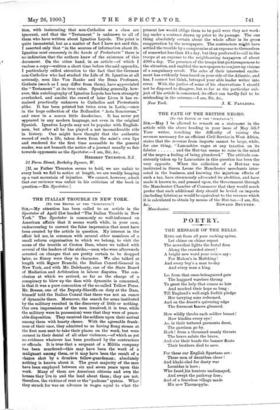THE ITALIAN TROUBLE IN NEW YORK.
(To THE EDITOR OF THE "SPECTATOR.")
Sin,—My attention has been called to an article in the Spectator of April 21st headed "The Italian Trouble in New York." The Spectator is commonly so well-informed on American affairs that it seems worth while, in your case, endeavouring to correct the false impression that must have been created by the article in question. My interest in the affair led me, in common with several other members of a small reform organisation to which we belong, to visit the scene of the trouble at Croton Dam, where we talked with several of the leaders of the strike,—men who were afterwards arrested on charges that are pretty certain to be dropped later, so flimsy were they in character. We also talked at length with Signor Branchi, the Italian Consul-General in New York, and with Mr. Delebanty, one of the State Board of Mediation and Arbitration in labour disputes. The con- clusion at which we arrived, so far as the charge of a conspiracy to blow up the dam with dynamite is concerned, is that it was a pure concoction of the so-called Yellow Press. Mr. Breese, one of the Deputy-Sheriffs on duty at the Dam, himself told the Italian Consul that there was not an ounce dynn mite there. Moreover, the search for arms instituted by the military resulted in the discovery of little or nothing. Our own impressions of the men (received, it is true, while the military were in possession) were that they were of peace- able disposition. They received the soldiers upon their arrival among them with hearty cheers. With the agreeable frank- ness of their race, they admitted to us having flung stones at the first men sent to take their places on the work, but were earnest in their denial of all other violences,—of which as yet no evidence whatever has been produced by the contractors or officials. It is true that a sergeant of a Militia company hag been murdered—this may have been the work of a malignant among them, or it may have been the result of a chance shot by a drunken fellow-guardsman; absolutely nothing is known about it. The great majority of the men have been employed between six and seven years upon this work. Many of them are American citizens and own the houses they live in and the land about them; they are not, therefore, the victims of rent or the "padrone" system. What they struck for was an advance in wages equal to what the
present law would oblige them to be paid were they not work- ing under a contract drawn up prior to its passage. The one thing absolutely certain about the whole affair is its gross exaggeration by the newspapers. The contractors might have settled the trouble by a compromise at an expense to themselves of somewhat less than £4 a day, but they preferred to call in the troops at an expense to the neighbouring taxpayers of about 2300 a day. The presence of the troops lent picturesqueness to the situation, and enabled the newspapers to conjure up visions of a sanguinary revolt. The echo of their interested excite- ment has evidently been heard on your side of the Atlantic, and has, I cannot but think, betrayed your able leader writer into error. With the justice of some of his observations I should not be disposed to disagree, but so fax as the particular sub- ject of his article is concerned, its effect can hardly fail to be misleading in the extreme.—I am, Sir, &c.,






































 Previous page
Previous page